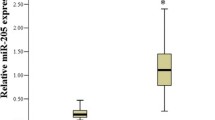Abstract
Backgrounds
microRNA-218 was proved to be a tumor-suppressor microRNA in several cancers, but its status in cervical cancer patients has not been established. In this study, we investigated the expression of microRNA-218 in the sera from cervical cancer patients and its relationships with clinico-pathological characteristics.
Methods
The expression of microRNA-218 was detected in the sera of 90 cervical cancer patients and 50 normal age-matched women by quantitative real-time PCR. The clinical data were collected and analyzed by statistical software.
Results
In the cancer group, microRNA-218 was reduced significantly in the sera (P < 0.001). Moreover, decreased microRNA-218 was associated with later stages, cervical adenocarcinoma, and lymphatic node metastasis.
Conclusions
microRNA-218 was deregulated in most cervical cancer patients and associated with tumor invasion.

Similar content being viewed by others
References
Alajez NM, Lenarduzzi M, Ito E, Hui AB, Shi W, Bruce J, Yue S, Huang SH, Xu W, Waldron J, O’Sullivan B, Liu FF (2011) MiR-218 suppresses nasopharyngeal cancer progression through downregulation of survivin and the SLIT2-ROBO1 pathway. Cancer Res 71:2381–2391
Bartel DP (2004) MicroRNAs: genomics, biogenesis, mechanism, and function. Cell 116:281–297
Brase JC, Wuttig D, Kuner R, Sultmann H (2010) Serum microRNAs as non-invasive biomarkers for cancer. Mol Cancer 9:306
Davis BN, Hata A (2010) microRNA in cancer—the involvement of aberrant microRNA biogenesis regulatory pathways. Genes Cancer 1:1100–1114
Gao C, Zhang Z, Liu W, Xiao S, Gu W, Lu H (2009) Reduced microRNA-218 expression is associated with high nuclear factor kappa B activation in gastric cancer. Cancer 116:41–49
Gien LT, Beauchemin MC, Thomas G (2010) Adenocarcinoma: a unique cervical cancer. Gynecol Oncol 116:140–146
Jemal A, Bray F, Center MM, Ferlay J, Ward E, Forman D (2011) Global cancer statistics. CA Cancer J Clin 61:69–90
Kloosterman WP, Plasterk RH (2006) The diverse functions of microRNAs in animal development and disease. Dev Cell 11:441–450
Kosaka N, Iguchi H, Ochiya T (2010) Circulating microRNA in body fluid: a new potential biomarker for cancer diagnosis and prognosis. Cancer Sci 101:2087–2092
Lee JW, Choi CH, Choi JJ, Park YA, Kim SJ, Hwang SY, Kim WY, Kim TJ, Lee JH, Kim BG, Bae DS (2008) Altered MicroRNA expression in cervical carcinomas. Clin Cancer Res 14:2535–2542
Lu J, Getz G, Miska EA, Alvarez-Saavedra E, Lamb J, Peck D, Sweet-Cordero A, Ebert BL, Mak RH, Ferrando AA, Downing JR, Jacks T, Horvitz HR, Golub TR (2005) MicroRNA expression profiles classify human cancers. Nature 435:834–838
Small EM, Sutherland LB, Rajagopalan KN, Wang S, Olson EN (2010) MicroRNA-218 regulates vascular patterning by modulation of Slit-Robo signaling. Circ Res 107:1336–1344
Song L, Huang Q, Chen K, Liu L, Lin C, Dai T, Yu C, Wu Z, Li J (2010) miR-218 inhibits the invasive ability of glioma cells by direct downregulation of IKK-beta. Biochem Biophys Res Commun 402:135–140
STATBITE (2011) http://info.cancerresearchuk.org/cancerstats/types/cervix/survival/
Tatarano S, Chiyomaru T, Kawakami K, Enokida H, Yoshino H, Hidaka H, Yamasaki T, Kawahara K, Nishiyama K, Seki N, Nakagawa M (2011) miR-218 on the genomic loss region of chromosome 4p15.31 functions as a tumor suppressor in bladder cancer. Int J Oncol 39:13–21
Tie J, Pan Y, Zhao L, Wu K, Liu J, Sun S, Guo X, Wang B, Gang Y, Zhang Y, Li Q, Qiao T, Zhao Q, Nie Y, Fan D (2010) MiR-218 inhibits invasion and metastasis of gastric cancer by targeting the Robo1 receptor. PLoS Genet 6:e1000879
Uesugi A, Kozaki K, Tsuruta T, Furuta M, Morita K, Imoto I, Omura K, Inazawa J (2011) The tumor suppressive microRNA miR-218 targets the mTOR component rictor and inhibits AKT phosphorylation in oral cancer. Cancer Res 71:5765–5778
Wu DW, Cheng YW, Wang J, Chen CY, Lee H (2010) Paxillin predicts survival and relapse in non-small cell lung cancer by microRNA-218 targeting. Cancer Res 70:10392–10401
Zhang B, Pan X, Cobb GP, Anderson TA (2007) microRNAs as oncogenes and tumor suppressors. Dev Biol 302:1–12
Zhang Z, Li Z, Gao C, Chen P, Chen J, Liu W, Xiao S, Lu H (2008) miR-21 plays a pivotal role in gastric cancer pathogenesis and progression. Lab Invest 88:1358–1366
Acknowledgments
Our project was supported by grants to Qiu Haifeng from Wuxi medical management center (No. YGM1016). We thank Xia Suhua for the histological assessment and He Jie for revising the manuscript.
Conflict of interest
None.
Author information
Authors and Affiliations
Corresponding author
Rights and permissions
About this article
Cite this article
Yu, J., Wang, Y., Dong, R. et al. Circulating microRNA-218 was reduced in cervical cancer and correlated with tumor invasion. J Cancer Res Clin Oncol 138, 671–674 (2012). https://doi.org/10.1007/s00432-012-1147-9
Received:
Accepted:
Published:
Issue Date:
DOI: https://doi.org/10.1007/s00432-012-1147-9




